Disgraceful Archaeology (13 page)
Read Disgraceful Archaeology Online
Authors: Paul Bahn
Dioskorides prescribed both human ordure and the dung of the vulture to bring about the expulsion of the foetus, and Pliny prescribed goose dung for this purpose; but according to Avicenna, the dung of the elephant or menstrual blood prevented conception.
The Roman statesman Cato the Elder provided some highly entertaining remedies â for example, placing a sprig of wormwood in the rectum prevents saddle sores (
62
). Pliny reckoned that kissing a she-mule's nostrils stops hiccups (this is probably true!), while gout can be cured using a toad's ashes mixed with stale grease. More encouragingly, he also claimed that sex was the best remedy for lower back pain, weakness of the eyes, and depression!
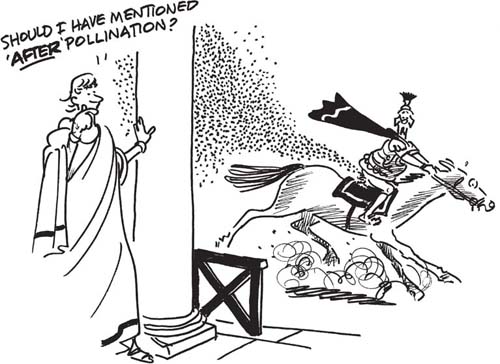
62
Finally, Pliny cites the method of curing a bad cough by spitting into the mouth of a toad (
63
).

63
In ancient Athens, when the bride arrived at the groom’s house, a basket of nuts was poured over her head for good luck by the other women of the household, a treatment also extended to newly purchased slaves. This was called the ‘
katachysmata
’ or ‘downpourings’.
A genuine Egyptian curse: ‘Anyone who does anything bad to my tomb, then the crocodile, the hippopotamus and the lion will eat him.’
In 1356, Abbot John of Kirkstall Abbey, at Leeds in northern England, organized some of his monks and four laymen into a gang to terrorize the neighbourhood. They besieged houses, damaged property, and stole goods!
The Egyptians hired female mourners to accompany the deceased to the last resting place — they covered their hair with ashes and wept and wailed on the tomb. In Egypt, it is said that in whatever house a cat died all the family shaved the eyebrows.
The Epic of Gilgamesh
of 3000 BC, the world’s first written story, begins with the gods creating a wildman, Enkidu, to divert King Gilgamesh from his habit of demanding first sexual congress with the local brides. Enkidu got his own sexual education from a rural prostitute: ‘For six days and seven nights Enkidu was erect’ before he was ready to fight Gilgamesh.
In Aristophanes ‘
The Peace
’, Trygaios instructs his slave to throw some barley into the audience (the Greek word for barley,
krithe
, also means penis). The slave reports the job accomplished: ‘Of all the spectators present, there isn’t one who did not get any barley’. Trygaios: ‘The women didn’t get any’. Slave: ‘But the men will give them some tonight’.
The Romans even exhibited African porcupines in the arena — naked boys had to catch them with their bare hands.
Julius Caesar was something of a dandy, always keeping his head carefully trimmed and shaved; and he was accused of having certain other hairy parts of his body depilated with tweezers. His baldness was a disfigurement which his enemies harped upon, much to his exasperation; he used to comb the thin strands forward, and loved to wear a laurel wreath whenever possible.
No one was allowed to leave the theatre during the emperor Nero’s recitals, however pressing the reason, and the gates were kept barred. We read of women in the audience giving birth, and of men being so bored with the music and the applause that they furtively dropped down from the wall at the rear, or played dead and were carried away for burial (
64
).
The entire body of the Roman emperor Otho (AD 69) had been depilated, and a well-made toupee covered his practically bald head. Since boyhood he had always used a poultice of moist bread to retard the growth of his beard.
The emperor Vespasian always wore a strained expression on his face; once he asked a well-known wit who always used to make jokes about people ‘why not make one about me?’, and the wit replied ‘I will, when you have at last finished relieving yourself.’
The Chinese emperor Cang Wu Wang (473–76) was a juvenile delinquent whose downfall was caused by shooting blunt arrows at a target he had painted on a sleeping minister’s belly. The minister retaliated by having him murdered and replaced by his 13-year-old half-brother.
The emperor Jing Zong (824–27) was a reckless teenager who filled the court with religious quacks and alchemists, and shot scented paper darts at his favourite concubines. He was murdered by exasperated eunuchs.
Much scatology and depicting of genitalia appeared in the medieval art and literature and performances of Europe. For
example, professional poets in Wales often composed works on sexual topics. In the fourteenth century, Dafydd ap Gwilym composed a poem in which he not only boasts about the size and energy of his penis (described metaphorically as a ‘pestle’ and an ‘expanding gun’) but berates it for having a will of its own (‘pod of lewdness, door-nail which causes a lawsuit and trouble’) (
65
). More than a century later, poetess Gwerful Mechain composed a piece praising female genitals, referring to the vulva as ‘a valley longer than a spoon or a hand’. Such works were performed in the halls of their patrons, the gentry. In medieval Ireland, stone carvings known as Sheela-na-gigs — grim-faced women with exaggerated and prominently-displayed genitalia — were often found above or beside doorways and windows, on castles and churches.
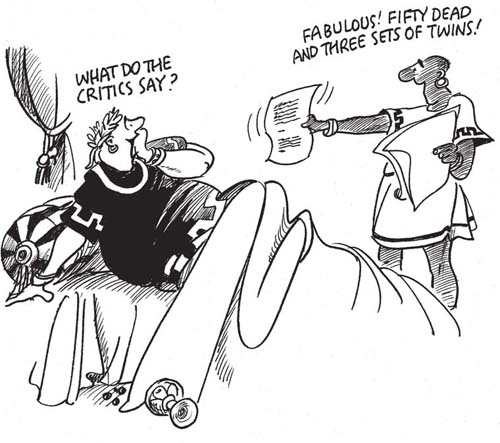
64
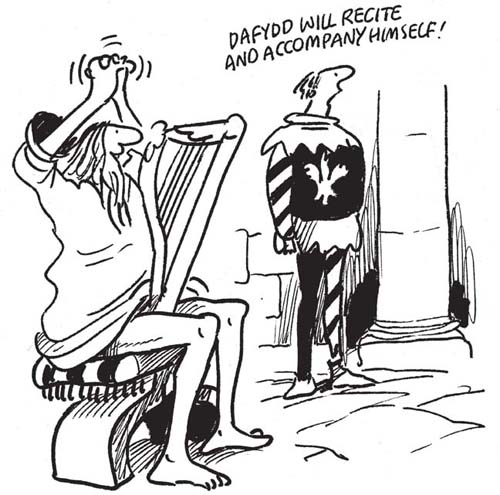
65
In the Classical world, doctors could treat hypospadias, a condition in which male organs suddenly appear on a female. Diodorus records such a case, describing the surgical tidying-up that rendered the organ feasible. The ‘wife’ ended up renaming herself and joined the army, while the husband committed suicide.
Pre-Christian sexual attitudes persisted in the early Church. Male bishops and abbots practised the custom of cupping their genitals with their hand to affirm an oath. They swore by the sacred seed within them that their words were true and correct (
66
).
Celtic saints were often born from unusual sexual circumstances. Creda was the mother of St Báithín, the second abbot of Iona. She was a good and holy woman who frequently
washed her hands and face in a small pool outside a church. One day, a thief hid in a tree over her head. Overcome by her fair face and shapely form, he secretly masturbated, allowing his semen to fall onto a bed of watercress. Perhaps intentionally, perhaps accidentally, Creda ate the watercress and miraculously gave birth to Báithin. This allowed Creda to remain technically virginal while granting Christian sanction to the Celtic belief in orally induced reproduction under wondrous circumstances .…
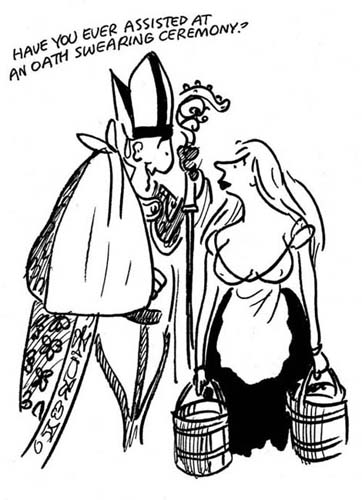
66
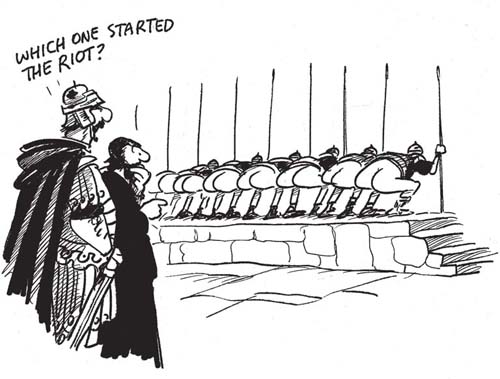
67
St Beuno’s elderly parents had not indulged in sex for twelve years when his mother amazingly found herself pregnant.…
The greatest insult: The historian Josephus tells us that:
When the multitude had come to Jerusalem, to the feast of unleavened bread, and the Roman cohort stood over the temple, one of the soldiers pulled back his garment, and stooping down after an indecent manner, turned his posterior to the Jews, and spake such words as might be expected upon such a posture
A riot followed, and ten thousand people were killed (
67
).

68
Sir Flinders Petrie, the British Egyptologist, took to working in Egypt in flesh-coloured combinations, so that Victorian lady-tourists, who were becoming a problem, would be confronted by what appeared to be a naked man emerging from the tombs, and head straight back to their houseboats and an early tea (
68
).